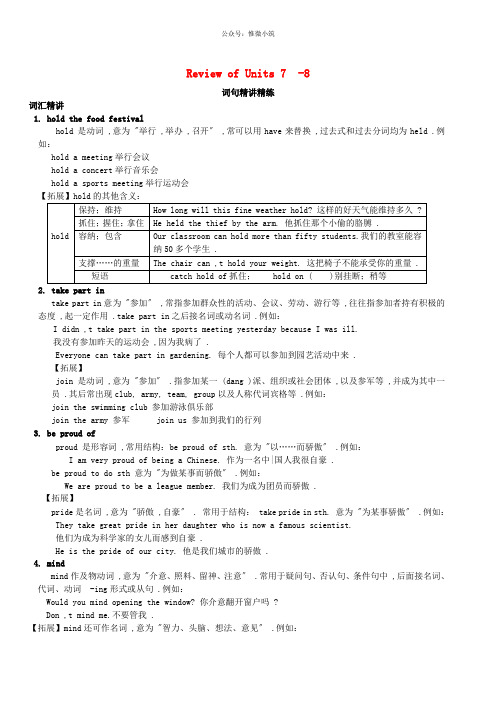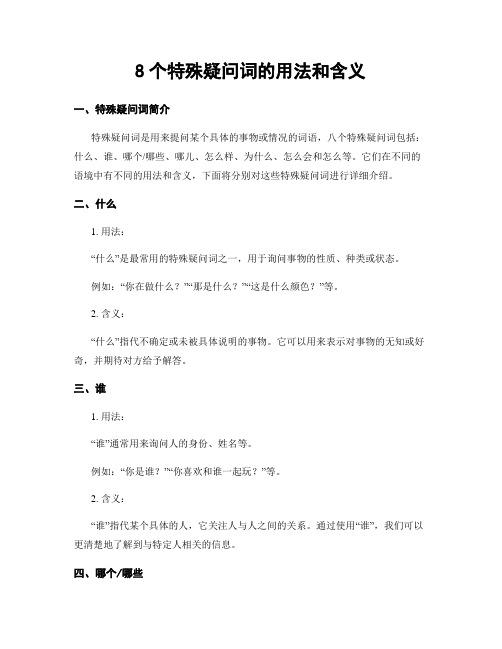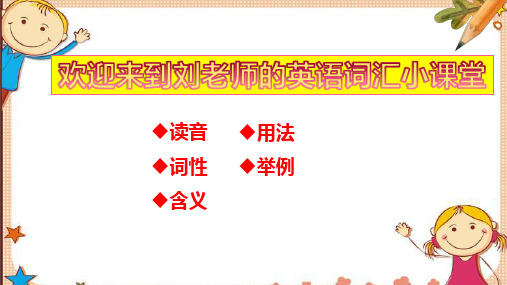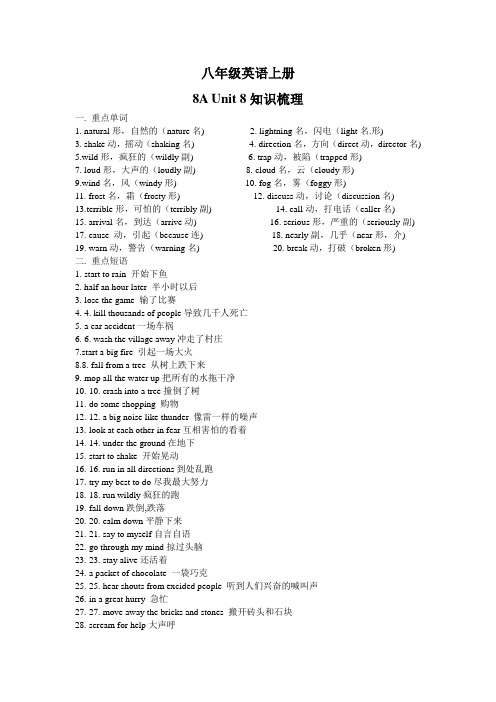8特殊词精讲
- 格式:doc
- 大小:36.00 KB
- 文档页数:4

8个特殊疑问词的用法总结一. 为什么要总结特殊疑问词的用法?特殊疑问词是英语中非常重要的一部分,它们能够帮助我们提出各种问题并获取准确的信息。
掌握这些特殊疑问词的用法不仅对于英语学习者来说十分重要,对日常交流和进一步提高口语表达能力也大有裨益。
二. What - 询问事物"What"是最常见、最基本的一个特殊疑问词。
当我们不知道某个事物或者需要更多信息时,可以使用"What"来询问。
例如:- What is your name?(你叫什么名字?)- What time is it now?(现在几点了?)- What is the meaning of this word?(这个单词的意思是什么?)三. Which - 选择当我们需要在若干选项中进行选择时,就可以使用"Which"来引导问题。
例如:- Which color do you prefer, red or blue?(你喜欢哪种颜色,红色还是蓝色?)- Which book did you buy, the red one or the blue one?(你买的书是哪一本,红色那本还是蓝色那本?)四. Where - 地点当我们想要了解某人或某物的位置时,可以使用"Where"来询问。
例如:- Where is the nearest supermarket?(最近的超市在哪里?)- Where do you live?(你住在哪里?)- Where did you go on vacation?(你去哪儿度假了?)五. When - 时间当我们想要了解某个事件或活动发生的时间时,可以使用"When"。
例如:- When is your birthday?(你的生日是什么时候?)- When does the movie start?(电影什么时候开始?)- When did you meet him?(你什么时候见到他的?)六. Why - 原因当我们想要了解某件事情发生的原因时,就可以使用"Why"来提问。

Review of Units 7 -8词句精讲精练词汇精讲1. hold the food festivalhold 是动词 ,意为 "举行 ,举办 ,召开〞 ,常可以用have来替换 ,过去式和过去分词均为held .例如:hold a meeting举行会议hold a concert举行音乐会hold a sports meeting举行运动会【拓展】hold的其他含义:2. take part intake part in意为 "参加〞 ,常指参加群众性的活动、会议、劳动、游行等 ,往往指参加者持有积极的态度 ,起一定作用 .take part in之后接名词或动名词 .例如:I didn ,t take part in the sports meeting yesterday because I was ill.我没有参加昨天的运动会 ,因为我病了 .Everyone can take part in gardening. 每个人都可以参加到园艺活动中来 .【拓展】join是动词 ,意为 "参加〞 .指参加某一 (dang )派、组织或社会团体 ,以及参军等 ,并成为其中一员 .其后常出现club, army, team, group以及人称代词宾格等 .例如:join the swimming club 参加游泳俱乐部join the army 参军 join us 参加到我们的行列3. be proud ofproud 是形容词 ,常用结构:be proud of sth. 意为 "以……而骄傲〞 .例如:I am very proud of being a Chinese. 作为一名中|国人我很自豪 .be proud to do sth 意为 "为做某事而骄傲〞 .例如:We are proud to be a league member. 我们为成为团员而骄傲 .【拓展】pride是名词 ,意为 "骄傲 ,自豪〞 . 常用于结构: take pride in sth. 意为 "为某事骄傲〞 .例如: They take great pride in her daughter who is now a famous scientist.他们为成为科学家的女儿而感到自豪 .He is the pride of our city. 他是我们城市的骄傲 .4. mindmind作及物动词 ,意为 "介意、照料、留神、注意〞 .常用于疑问句、否认句、条件句中 ,后面接名词、代词、动词 -ing形式或从句 .例如:Would you mind opening the window? 你介意翻开窗户吗 ?Don ,t mind me.不要管我 .【拓展】mind还可作名词 ,意为 "智力、头脑、想法、意见〞 .例如:He has quick mind. 他头脑敏锐 .Tom changed his mind at last. 最||后Tom改变了主意 .5. go shopping"go +动词 -ing形式〞表示 "去做某事〞 ,常用于从事某一项体育活动或休闲娱乐活动 ,动名词前面不能用some或其他表示数量概念的词语修饰 ,常见的短语有:go bike riding 骑自行车远行 go sightseeing 去观光go shopping去买东西 go skating去滑冰go swimming去游泳 go boating去划船go walking去散步 go climbing去登山go dancing去跳舞 go hiking 去远足【拓展】动词do后跟动名词形式构成短语 ,动名词作do的宾语 ,具有名词性质 ,可以用some或the 修饰 .例如:do some reading阅读 do some washing洗涮 do some cooking做饭do some swimming游泳 do some speaking多说 do some listening多听6. be made ofbe made of 意为 "由……制成〞 .例如:例如:These bottles are made of glass.这些瓶子是由玻璃制成的 .Wine is made from grapes. 红酒是葡萄酿的 .This car is made in Tianjin. 这辆车是在天津制造的 .7. plan(1) 作动词 ,意为 "方案 ,打算〞 ,其现在分词为planning ,过去式和过去分词为planned .常用于"plan to do sth.方案干某事〞的结构中 .例如:They are planning to go hiking this weekend. 他们正在方案本周末远足的事 .(2) 作可数名词 ,意为 "方案 ,方案〞 ,make a plan意为 "制定方案〞; plan for意为"……的方案〞 .例如:What are your plans? 你的方案是什么 ?Make a plan for study, please. 请制定学习方案 .8. not only...but a lso…(1) not only...but also的意思是 "不但……而且……〞 ,连接两个并列成分 ,如果连接两个主语的时候 ,谓语动词和also后面的主语保持一致 .例如:Not only my mother but also I like to go to the garden. 不仅妈妈而且我也喜欢去公园 .(2) 以not only…but also 开头的句子往往引起倒装 .Not only did he complain about the food, but he refused to pay for it.他不仅抱怨饭不好吃 ,而且拒绝||付饭钱 .词汇精练I. 英汉互译 .1. get in touch with ________________2. 尽最||大努力________________3. set the table ________________4. in order to ________________5. 变为现实________________6. eat up________________7. pick up ________________ 8. not only…but(also)…________________9. take off ________________ 10. 依赖;取决于________________II. 根据句意及首||字母和汉语提示写出所缺单词 .1. Let ,s try our best to make it a s______________.2. It ,s i______________ to eat with your arms or elbows on the table in America.3. High marks d_____________ on hard working and more time.4. May I __________(邀请) you to our food festival?5. The sweater is so expensive that I can a____________.6. I r____________ to tell you that I cannot come.7. His ________(任务) is to carry water.8. - Which is the most ________ (传统的) festival of China?- Spring Festival.9. He wants to be a ________ (军人).10. My aunt will come here by plane. And I will meet her at the a________.Ⅲ. 从下面方框中选择所给的单词或词组 ,根据句意用正确的形式完成句子 .1. The girl is a good ___________.2. You ,d better ___________ here.3. My mother ___________ some cooking at 6 o ,clock yesterday.4. This math problem is very simple. I can work it out ________.5. Mike is __________ than Jim at swimming.6. She has __________ since 10 o ,clock.7. I _________ the name of the TV play before.8. We ,ll cook and sell delicious international food_________9. You often teach me _________ the poor and the old.10. If you finish ________ the book, you can have a rest.参考答案I. 英汉互译 .1. (与……)取得联系2. try one ,s best3. 摆放餐具4. 为了5. come true6. 吃完 ,吃光7. 捡起;获得;收拾8. 不仅……而且……9. 脱下 (衣服 );摘掉 10.depend onII. 根据句意及首||字母和汉语提示写出所缺单词 .1. success2. impolite3. depend4. invite5. afford6. regret7. task8. traditional9. soldier 10. airportIII. 用括号内所给单词的适当形式填空 .1. singer2. not smoke3. wasn ,t doing4. easily5. better6. been here7. have heard of8. by ourselves9. to be kind to 10. reading句式精讲1. Do you think that the children need to make tea?这是一个由that引导的宾语从句 ,从句为陈述句 .连词that在此句中无实际意义 ,在口语或非正式文体中常常省略 .动词 (及物动词 )、介词和某些形容词后面可跟that引导的宾语从句 ,较常用的有say, think, know, hope, see, hear, believe, imagine, remember, mean, glad等 .例如:I believe (that) we ,ll make a lot of money for Daniel. 我相信我们将为丹尼尔筹许多钱 .I ,m glad that you have come. 我很快乐你来了 .【注意】当主句为一般现在时态时 ,宾语从句可根据实际需要选用不同的时态 .例如:I think (that) he ,ll be all right in a few days. 我想他几天后就会好了 .She says (that) someone is waiting for you at the school gate. 她说有人在校门口等你 .Xiao Wang believes I am right. 小||王认为我是对的 .We know (that) he took part in the school sports meeting last year. 我们知道他去年参加了校运动会 .2. We raised money to help child workers go to school.help sb. do sth.意为 "帮助某人做某事〞 .此句型也可以说成:help sb. to do sth. .例如: He helps me to learn English. = He helps me learn English. 他帮助我学习英语 .【拓展】(1) help sb. with sth.在某事上帮助某人例如:My maths teacher helps me with my maths. 我的数学老师在数学上帮助我 .(2) help 也可以作名词 ,作名词时常用于以下短语:with one ,s help = with the help of 在……的帮助下例如:With Mary ,s help, I made rapid progress in English learning. =With the help of Mary, I made rapid progress in English learning.在Mary的帮助下 ,我在英语学习方面进步很快 .3. Next, you need to put some oil in the pan.本句中用了need to do sth. 的结构 ,need to do sth. 意为 "需要做某事〞 .例如:You need to come here early. 你需要早来这里 .【拓展】(1) need后还可以直接接宾语 ,即need sb. / sth. 例如:He needs some help. 他需要些帮助 .I need a new coat.我需要一件新外套 .He didn ,t need the money. 他不需要这笔钱 .(2) need作为情态动词的用法:need作为情态动词使用时 ,后面接动词原形;常用来答复以must开头的一般疑问句的否认答复 .例如: She need wash her car now. 她现在要洗车 .→Need she wash her car now? (一般疑问句)→She needn ,t wash her car now. (否认句)- Must he repair the clock now? 他现在必须修钟吗 ?- No, he needn ,t. He can repair it this afternoon. 不 ,没必要 .他可以今天下午修 .4. It ,s important for you to help people choose suitable clothing.It is/was + adj. + to do sth. 意为 "做某事是……的〞 ,to do sth.为句子的真正的主语 ,而it 为形式主语 ,形式主语不能用别的词来代替 ,句中可在形容词后加for sb. ,意为 "对于某人来说 ,做某事是……的〞 .例如:It ,s important for us to learn a foreign language. 对我们来说 ,学习一门外语是相当重要的 .It ,s necessary for us to eat more fruit and vegetables. 对我们来说 ,多吃蔬菜和水果是必要的 . 【拓展】这个句型中的for sb.有时也可以用of sb. 二者意义有区别:(1) 在It ,s + adj. + for sb. to do sth. 中 ,for sb.意为 "对某人来说〞 ,句中的形容词是用来说明to do sth.的 ,形式主语只能用it .例如:It ,s necessary for the students to do some housework. 对于学生们来说 ,做些家务是十分必要的 .(2) 在It ,s + adj. + of sb. to do sth. 中of sb. 意为 "某人……〞 ,句中形容词可与逻辑主语sb. 构成系表结构 ,即形容词是用来说明或形容sb. (某人 )的 .例如:It ,s very kind of you to help us. 你能帮助我们真是太好了 .5. Helping people choose clothes is important.本句的主语是helping people choose clothes .动名词作主语时 ,谓语动词要用第三人称单数形式 .例如:Swimming is good for our health. 游泳对我们的健康有益 .Learning English is very important. 学英语是很重要的 .【拓展】动名词和不定式都可以作主语 ,但在用法上有区别:(1) 不定式作主语通常表示一次性、未来的且具体的特指动作 ,而动名词作主语通常表示习惯性、经常性和不具体的泛指动作 .例如:Walking is a good form of exercise for both the young and the old.步行对年轻人和老年人来说都是一种好的锻炼形式 .To carry the heavy box is not easy for the boy. 对这个男孩来说 ,搬这个箱子是不容易的 .(2) 动名词作主语和不定式作主语有时可以互换 .例如:Playing with fire is dangerous. = To play with fire is dangerous. 玩火是危险的 .【注意】动词不定式作主语时 ,常用it作形式主语 ,即: It is + adj. + (for/ of sb )to do sth.句式精练I. 根据汉语提示 ,完成英语句子 (每空一词 ) .1. 在法国 ,就餐时吸烟是不礼貌的 .It ,s impolite___________ ___________during a meal in France.2.学好英语对我们来说很重要 .It ,s important ___________ ___________ ___________ learn English well.3. 这辆车在出售吗 ?我想买 .Is this car ___________ ___________? I want to buy it.4. 你能想象他5岁的时候就会骑自行车吗 ?Can you i___________ he could ___________ a bike when he was 5 years old?5. 这本书值得读几遍 .The book is ___________ ___________ for several times.6. 我没有参加昨天的会议 ,因为我病了 .I didn ,t ___________ ___________ ___________ the meeting because I was ill.7. 不仅我哥哥而且我也喜欢看电视剧 .___________ ___________ my brother ___________ ___________ I like watching TV plays. 8. 她周末帮妈妈做家务 .She ___________ her mother ___________ the housework at the weekend.9. 这块布是由棉花做的 .The cloth ___________ ___________ ___________ cotton.10. 他们为成为教师的儿子而感到自豪 .They___________ ___________ ___________ their son who is now a teacher.II. 句型转换 ,每空一词 .1. They saw some birds in the tree. (改为否认句 )They___________ see ___________ birds in the tree.2. Would you mind opening the window? (改为否认句 )Would you mind ___________ ___________ the window?3. They are working very hard. (改为感慨句 )___________ ___________ they are working!4. Jim seemed very happy. (改为同义句 )It ___________ that Jim ___________ very happy.5. He does his homework every day. (对划线局部提问 )___________ ___________does he do his homework?6. Could you tell me? Where are the special shoes? (合并成一句 )Could you tell me ___________ the special shoes ___________?7. Jim works hard at school. (改为否认句 )Jim___________ ___________ hard at school.8. I ,d like to wear my own clothes. (改为一般疑问句 )___________ you like to wear ___________ own clothes?9. What ,s the matter with you? (改为同义句 )What ,s___________ ___________ you?10. They are made of cotton. (对划线局部提问 )___________ are they made ___________?III. 补全对话 .通读下面的对话 ,然后根据上下文补全对话内容 .A: Hello, Bob. I called you yesterday afternoon, but there was no reply.B: Sorry, I didn ,t take my phone with me.A: 1._____________________________________?B: I was in a bookstore.A: 2. _____________________________________?B: I was choosing some books.A: 3. _____________________________________?B: Yes, I did. I bought some books about folk stories.A: Folk stories? I like them very much. 4. _______________________________________?B: Yes. You can borrow one or two from me. But why not buy some for yourself? I can go with you to the bookstore.A: Good idea. Thank you very much.B: 5._____________________________________.参考答案I. 根据汉语提示 ,完成英语句子 (每空一词 ) .1. to smoke2. for us to3. for sale4. imagine; ride5. worth reading6. take part in7. Not only; but also8. helps; do/with9. is made from 10. take pride in/areproud ofII. 句型转换 ,每空一词 .1. didn ,t, any2. not opening3. How hard4. seemed, was5. How often6. where, are7. doesn ,t work8. Would, your 9. wrong with 10. What, ofIII. 补全对话 .1.Where were you2.What were you doing3.Did you buy any books4.Can/Could I borrow some from you/Can you lend some to me5.You ,re welcome。

8个特殊疑问词的用法和含义一、特殊疑问词简介特殊疑问词是用来提问某个具体的事物或情况的词语,八个特殊疑问词包括:什么、谁、哪个/哪些、哪儿、怎么样、为什么、怎么会和怎么等。
它们在不同的语境中有不同的用法和含义,下面将分别对这些特殊疑问词进行详细介绍。
二、什么1. 用法:“什么”是最常用的特殊疑问词之一,用于询问事物的性质、种类或状态。
例如:“你在做什么?”“那是什么?”“这是什么颜色?”等。
2. 含义:“什么”指代不确定或未被具体说明的事物。
它可以用来表示对事物的无知或好奇,并期待对方给予解答。
三、谁1. 用法:“谁”通常用来询问人的身份、姓名等。
例如:“你是谁?”“你喜欢和谁一起玩?”等。
2. 含义:“谁”指代某个具体的人,它关注人与人之间的关系。
通过使用“谁”,我们可以更清楚地了解到与特定人相关的信息。
四、哪个/哪些1. 用法:“哪个”和“哪些”用来询问选择或归属关系。
其中,“哪个”用于单数,“哪些”用于复数。
例如:“你要选哪个?”“这些书是哪些人的?”等。
2. 含义:“哪个/哪些”指代有几种可能性中的一个或多个,它们强调选择的范围,并期待对方给出具体答案。
五、哪儿1. 用法:“哪儿”常用来询问地点、位置等。
例如:“你在哪儿?”“这家店在哪儿?”等。
2. 含义:“哪儿”指代某一具体位置或地点。
通过使用“哪儿”,我们可以更准确地了解到事物所处的空间位置。
六、怎么样/怎么会1. 用法:“怎么样”通常用来询问情况、结果等;而“怎么会”则表示对某种原因感到惊讶或质疑。
例如:“你觉得这本书怎么样?”“他竟然能跑赢我,怎么会?”等。
2. 含义:“怎么样”询问某种状态或结果;而“怎么会”表示对某种情况或结果感到意外或疑惑。
七、为什么1. 用法:“为什么”用来询问原因、理由等。
例如:“为什么你今天不来上课?”“你为什么选择这个工作?”等。
2. 含义:“为什么”表示对某种现象产生疑问,希望了解其背后的原因或动机。

专八核心词汇速记讲义1.Indeed, if many investors abjure the listing, those who hold their noses and take the plunge might make even more money. 当然,如果许多投资人放弃购买该公司的股份,那些铤而走险的人也许真的会赚更多的钱。
(专八词汇—精选例句)【abjure】[əb'dʒuə](vt.)发誓放弃;公开放弃(意见、信仰、权利、国籍等)(专八词汇)1个考点搭配:abjure the realm★与“词根jur-法律;发誓”有关的单词:(1)abjuration [,æbdʒuə'reiʃən](n.)发誓放弃;公开放弃(意见等)(专八词汇)(ation-复合名词后缀)(2)jural [['dʒuərəl](adj.)法律上的,有关权利义务的(专八词汇)(1个考点搭配:Jural Society )(3)jury ['dʒuəri](n.)陪审员;陪审团;评判委员会1个派生词:●juror ['dʒʊərə](n.)陪审团的一员(专八词汇)(or-人)(4)injure['indʒə](v.)损害,损伤,伤害(1个考点搭配:an injured adventurer )1个派生词:●injurious [in'dʒʊəri:əs](adj.)伤害的;中伤的;不公正的(专八词汇)(5)adjure [ə'dʒuə](vt.)起誓;(郑重)恳求,祈求(专八词汇)2个派生词:●adjuration [,ædʒuə'reiʃən](n.)起誓,严令;(郑重)恳求,祈求(专八词汇)(ation-复合名词后缀)●adjuratory [ə'dʒuərətəri](adj.)誓言的;(郑重)恳求的(专八词汇)(ory-形容词后缀)(6)conjure['kʌndʒə](v.)①念咒召唤(神灵、魔鬼等);用魔法变出,施魔法②恳求,祈求(专八词汇)2个派生词:●conjuration[,kɔndʒuə'reiʃən](n.)以神名召唤;施法;魔术(专八词汇)(ation-复合名词后缀)●conjurer [kʌn'dʒurə](= conjuror ['kʌndʒərə])(n.)巫师,行妖术者;魔术师(专八词汇)(er-表人)(7)perjure ['pə:dʒə](vt.)使发假誓;使作伪证,为…作伪证(专八词汇)3个派生词:●perjured ['pə:dʒəd](adj.)伪证的(专八词汇)(ed-的)●perjury ['pə:dʒəri](n.)【律】伪证(罪) (专八词汇)(y-名词后缀)●perjurer ['pə:dʒərə](n.)发假誓者;作伪证者(专八词汇)(er-表人)★词根“juris-法律”:(1)jurisdiction [,dʒuəris'dikʃən](n.)司法权;管辖权;管辖范围;权限(专八词汇)(2)jurisprudence[,dʒʊərɪs'pru:dns](n.)法学,法理学(专八词汇)★词根“judg-法律;判断”:⑴judgment(= judgement)['dʒʌdʒmənt](n.)判断(力),鉴定;判决,审判(2)adjudge [ə'dʒʌdʒ](vt.)判决,裁决(专八词汇)(3)prejudge ['pri: 'dʒʌdʒ](v.)预先判断(专八词汇)★词根“judic-法律;判断”:(1)judicial [dʒu:'diʃəl](adj.)司法的;法庭的;法官的;公正的(专八词汇)(1个考点搭配:judicial bureau )(2)judiciary [dʒu: 'dɪʃi: ,eri:](n.)司法部;(总称)法官;司法制度(adj.)法院的;司法的(GRE 词根)(3)judicious [dʒu: 'dɪʃəs](adj.)明智的;有判断力的,有见识的(GRE词根)1个扩展词:●injudicious [,indʒu: 'diʃəs](adj.)不明智的;判断不当的(专八词汇)(in-否定)(4)adjudicate [ə'dʒu:d i,keɪt](vt.)判决,裁决;当…的评判员(或裁判员、仲裁人)(n.)判决,宣判;裁判员(GRE词根)(5)prejudice ['predʒudis](n.)偏见;歧视;【律】损害,侵害(vt.)使有偏见;不利于,损害★单词“just-(adv.)恰好,正好;刚刚好(adj.)正义的,公正的”:(1)justify ['dʒʌstif](vt.)证明…是正当的;为…辩护;是…的正当理由(辨析justify、testify 两词两词都与“证明”有关,但侧重点不同。


八年级英语上册8A Unit 8知识梳理一.重点单词1. natural形,自然的(nature名)2. lightning名,闪电(light名.形)3. shake动,摇动(shaking名)4. direction名,方向(direct动,director名)5.wild形,疯狂的(wildly副)6. trap动,被陷(trapped形)7. loud形,大声的(loudly副) 8. cloud名,云(cloudy形)9.wind名,风(windy形) 10. fog名,雾(foggy形)11. frost名,霜(frosty形) 12. discuss动,讨论(discussion名)13.terrible形,可怕的(terribly副) 14. call动,打电话(caller名)15. arrival名,到达(arrive动) 16. serious形,严重的(seriously副) 17. cause 动,引起(because连) 18. nearly副,几乎(near形,介)19. warn动,警告(warning名) 20. break动,打破(broken形)二.重点短语1.start to rain 开始下鱼2. half an hour later 半小时以后3.lose the game 输了比赛4.4. kill thousands of people导致几千人死亡5.a car accident一场车祸6.6. wash the village away冲走了村庄7.start a big fire 引起一场大火8.8. fall from a tree 从树上跌下来9.mop all the water up把所有的水拖干净10.10. crash into a tree撞倒了树11.do some shopping 购物12.12. a big noise like thunder 像雷一样的噪声13.look at each other in fear互相害怕的看着14.14. under the ground在地下15.start to shake 开始晃动16.16. run in all directions到处乱跑17.try my best to do尽我最大努力18.18. run wildly疯狂的跑19.fall down跌倒,跌落20.20. calm down平静下来21.21. say to myself自言自语22.go through my mind掠过头脑23.23. stay alive还活着24.a packet of chocolate 一袋巧克25.25. hear shouts from excided people 听到人们兴奋的喊叫声26.in a great hurry 急忙27.27. move away the bricks and stones 搬开砖头和石块28.scream for help大声呼29.29. a slight shaking through my body一阵轻微的震动传过我的身体30.survive the earthquake 在地震中幸存31.31. be trapped陷入困境32.drop a little下降了一点33.33. become worse 更糟34.the weather today今天的天气35.35. search the Internet上网36.discuss…with…和……讨论……37.37. plan a trip to Tangshan计划去唐山旅行38.on the side of the road 在路的一侧39.39. drive you to school 开车送你去学校40.as usual像往常一样41.41. break down 损坏42. a terrible snowstorm一场可怕的暴风雪43. weather conditions 天气情况44. cover the whole road 覆盖了整个路45. time of arrival 到达的时间46. get worse变得更糟47. crash into 陷入,撞到48. catch fire 着火49. send the victims to…把受害人送到……50. share…with…和……分享/分担……51. look out of the window 向窗外看52. forget to bring my keys 忘记带我的钥匙53. continue to fall around us 继续在我们周围飘落54. come from behind 从后面来55. fall over 跌倒56. weather report 天气预报57. snowstorm warning 暴风雪警报58. the noise of traffic 交通的吵闹声59. remove the snow除去积雪60. typhoon signal number台风警告指数61. the terrible situation恶劣的情形62. social workers社会工作者63. the people in need 需要的人们64. give out food 吩咐法食物65. clean drinking water干净的饮用水三. 重点语句及讲解1. Lighting started a big fire in a house. 闪电引起一座房屋着火.(1)start a fire意思是“引起火”,词组on fire (着火),指状态;catch fire (着火),强调动作,如:The house caught fire last night .昨晚房屋着火了。
专八词汇讲义英语专业八级词汇精讲第一节如何记忆单词阅读记忆生词圈出,反复研读句子,勾画词组,了解替换,熟词辟意词根、词缀、词源、字母组合规律记单词前缀:确定肯定、否定和方向后缀:确定词性词根:确定词义regress v后退,退步-gress: to goprogress v.进步re- 再一次;向后ingress n.进入in-: intoimprovise vi.即兴创作vis-: to seeim-: into; notbenefactor n. 行善者,施主fact-: to make一、词源记忆法(如何找词源:看读音,看拼写,看意思)如果单词没有词根词缀,则依据单词词源(etymology)。
顾名思义,指词的来源。
主要适用于单音节词汇,帮助考生解释词根。
如何寻找词源:首先需去掉词根与词缀。
其次,看读音,看拼写,最重要的是看意思。
EX: shelter n.v 避难所,保护shield n. 盾牌,保护Shell即为词源。
Shell是贝壳。
起保护作用。
在词源的结尾加辅音字母t或者d,并作相应变化,即为shield与shelter。
EX: fetter n. v. 束缚,脚镣。
词源为feet,去掉元音e,加词缀ter,构成fetter。
词源变化规则1.原音之间可以互换a,e,i,o,u,yEX: feasible a可行的例如:a feasible plan一个可行的计划feas=fac=fact原音和原音字母组合之间替换。
Fact本义是制造。
例如,factory工厂,manufacturing制造业。
此处,将元音字母a替换成ea,而c相当于s。
例如,advice与advise;practice与practise。
Ible=able。
2.辅音之间可以互换p/b, t/d, k/g/c/qu, f/v, s/z/x/thEX: wife(妻子)变复数形式为wives。
F与v之间发生替换。
EX: disburse v支付,付款= pay for。
八年级下册Unit 8 (词汇+语法讲解)(学习版)编制人:__________________审核人:__________________审批人:__________________编制学校:__________________编制时间:____年____月____日序言下载提示:该文档是本店铺精心编制而成的,希望大家下载后,能够帮助大家解决实际问题。
文档下载后可定制修改,请根据实际需要进行调整和使用,谢谢!并且,本店铺为大家提供各种类型的经典范文,如英语单词、英语语法、英语听力、英语知识点、语文知识点、文言文、数学公式、数学知识点、作文大全、其他资料等等,想了解不同范文格式和写法,敬请关注!Download tips: This document is carefully compiled by this editor.I hope that after you download it, it can help you solve practical problems. The document can be customized and modified after downloading, please adjust and use it according to actual needs, thank you!In addition, this shop provides various types of classic sample essays, such as English words, English grammar, English listening, English knowledge points, Chinese knowledge points, classical Chinese, mathematical formulas, mathematics knowledge points, composition books, other materials, etc. Learn about the different formats and writing styles of sample essays, so stay tuned!八年级下册Unit 8 (词汇+语法讲解)【单词变性】actually副词变形容词______________________beauty名词变形容词______________________fiction名词变形容词______________________French形容词变名词______________________laughter名词变动词______________________success名词变形容词______________________introduce动词变名词______________________【一词多义】1. due _________________ ____________________Due to the bad weather, our flight was cancelled.The next train is due in five minutes.2. land _____________ ____________Our plane will land on the island in thirty minutes. We live on the land while fishes mostly live in the river.3. line _____________ ___________ _______________He is not on the line, so I can’t connect with him. Look, some birds are standing on the line.I sit on the sixth line.4. mark ____________ __________ ________________You can see the important point in red mark.Do you know your mark for the English examination?You can mark here in red to show its importance.5. record ____________ ____________ ____________Would you like to become a member of World Genuis Records?Have you recorded what the teacher said?Jay Zhou has made a lot of records which are really popular.6. rock _______________ _______________There are rocks around the seaside.Rock is a type of music which sounds energetic.7. hurry _____________ _____________Hurry up. There is little time left.We ran to the railway station in a hurry because there is little time left.8. fan _____________ _____________In the old times, we use fans instead of air-conditioner to cool ourselves.Usually fans are crazy when they meet their idle.【词汇用法】1. success: n./it’s a success that…2. belong: vi./belong to sb./无被动3. hurry: v./hurry to do sth./hurry up/n./in a hurry4. introduce: v./introduce sb. to sb./introduceoneself/introduce in【高频短语】due to________________go abroad________________travel abroad________________on the island________________break the records________________make a record________________set a record________________millions of________________belong to________________hurry up________________in a hurry________________introduce oneself________________。
1Unit 8重点词语精讲精练词汇拓展 词形变换1. shake→shook (过去式) 2 .blend→blender (名词) 3 final→finally (副词) 4. dig→dug (过去式)5. .hole→whole (同音词)6. .sandwich→sandwiches (复数)6. .tradition→traditional (形容词) 8..celebrate→celebrated (过去式)→celebration (名词 9. .mix→mixed (过去式)—→mixes (第三人称单数形式) 10. serve —→servant (名词,指人) 词语辨析turn on“打开”,其反义词组是_______________________关上”。
turn on ,turn off 是由动词和副词构成的词组,接代词作宾语时,代词放在词组之间,接名词作宾语时,名词通常放在词组后面。
________________把它关上__________________把它打开,【辨析】turn on 和open 二者都有“打开”的意思,但“打开”的对象不同。
turn on 通常指打开水龙头、煤气、电灯、电视、收音机等的开关。
open 通常指打开书、门窗、箱子、盒子等。
Please _____________.请打开灯。
They _____________他们打开了窗户。
与turn 相关的词组有:_____________ 调大 _____________调小_____________ 上交_____________使成为,翻译成 turn out 关,熄灭 turn to 转向 _____________ 向左/右转 _____________ 变绿 _____________…把……变成……turn to…翻到…… turn over 翻转turn in 上交词语辨析cut up 切碎,接代词作宾语时,代词放在词组之间,接名词作宾语时,名词通常放在词组后面。
人教版英语七年级上册Unit 8 知识点汇总和考点精讲Unit 8 单词when /wen/ adv. (疑问副词)什么时候month /mʌnθ/ n. 月;月份January /'dʒænjuəri/ n. 一月February /'februəri/ n. 二月March /ma:tʃ/ n. 三月April /'eiprəl/ n. 四月May /mei/ n. 五月June /dʒu:n/ n. 六月July /dʒu'lai/ n. 七月August /'ɔ:gəst/ n. 八月September /sep'tembə/ n. 九月October /ɔk'təubə/ n. 十月November /nəu'vembə/ n. 十一月December /di'sembə/ n. 十二月happy /'hæpi/ adj. 愉快的;高兴的Happy birthday! 生日快乐!old /əuld/ adj. 年老的;旧的How old...? ...多大年纪?...几岁了?party /'pa:ti/ n. 聚会;晚会See you! 再见!first /fə:st/ num. 第一second /'sekənd/ num. 第二third /θə:d/ num. 第三fifth /fifθ/ num. 第五eighth /eit θ/ num. 第八ninth /nainθ/ num. 第九twelfth /twelfθ/ num. 第十二twentieth /'twentiəθ/ num. 第二十test /test/ n. 测验;检查trip /trip/ n. 旅游;旅行art /a:t/ n. 艺术;美术festival /'festivl/ n. (音乐、戏剧等的)节;节日dear /diə/ adj. 亲爱的student /'stju:dnt/ n. 学生thing /θiŋ/ n. 东西;事情term /tə:m/ n. 学期busy /'bizi/ adj. 忙碌的;无暇的time /taim/ n. 时间Have a good time! (表示祝愿) 过得愉快!there /ðeə/ adv. (在)那里02 知识梳理【重点短语】1. my father’s birthday我爸爸的生日2. happy birthday (to you) (祝你)生日快乐3. in August 在八月4. have a birthday party 举办一个生日派对5. have a book sale 举行一次书籍拍卖6. have an art festival 举办一次艺术节7. have an English party 举办一个英语派对8. have a basketball game 举办一场篮球赛9. School Day 学校开放日10. Teachers’ Day教师节11. Mother’s Day母亲节12. Women’s Day妇女节13. Sports Day 体育节14. two ball games 两场球赛15. this term 这学期16. in the afternoon 在下午17. on the 12th 在12日那天18. next month 下个月19. in the school library 在学校图书馆20. have a good time 玩得开心【重点句型】1. —When is your/his/her birthday? 你/他/她的生日是何时?—My/His/Her birthday is on November 11th. 我/他/她的生日是11月11日。
8. 特殊词精讲8.1 stop doing/to dostop to do停止,中断做某事后去做另一件事。
stop doing停止做某事。
They stop to smoke a cigarette.他们停下来,抽了根烟。
I must stop smoking..我必须戒烟了。
典型例题She reached the top of the hill and stopped ___on a big rock by the side of the path.A. to have restedB. restingC. to restD. rest答案:C。
由题意可知,她到了山顶,停下来在一个路边的大石头上休息。
因此,应选择"stop to do sth. 停下来去做另一件事"。
而不仅仅是爬山动作的终止,所以stop doing sth.不正确。
8.2 forget doing/to doforget to do忘记要去做某事。
(未做)forget doing忘记做过某事。
(已做)The light in the office is stil on. He forgot to turn it off.办公室的灯还在亮着,它忘记关了。
(没有做关灯的动作)He forgot turning the light off.他忘记他已经关了灯了。
( 已做过关灯的动作)Don't forget to come tomorrow.别忘了明天来。
(to come动作未做)典型例题---- The light in the office is still on.---- Oh,I forgot___.A. turning it offB. turn it offC. to turn it offD. having turned it off答案:C。
由the light is still on 可知灯亮着,即关灯的动作没有发生,因此用forget to do sth.而forget doing sth表示灯已经关上了,而自己忘记了这一事实。
此处不符合题意。
8.3 remember doing/to doremember to do 记得去做某事(未做)remember doing记得做过某事(已做)Remember to go to the post office after school.记着放学后去趟邮局。
Don't you remember seeing the man before?你不记得以前见过那个人吗?8.4 regret doing/to doregret to do对要做的事遗憾。
(未做)regret doing对做过的事遗憾、后悔。
(已做)I regret to have to do this, but I have no choice.我很遗憾必须这样去做,我实在没有办法。
I don't regret telling her what I thought.我不为告诉她我的想法而后悔。
典型例题---You were brave enough to raise objections at the meeting.---Well, now I regret ___ that.A. to doB. to be doingC.to have doneD.having done答案:D。
regret having done sth. 对已发生的事感到遗憾。
regret to do sth. 对将要做的事感到遗憾。
本题为对已说的话感到后悔,因此选D。
8.5 cease doing/to docease to do长时间,甚至永远停做某事。
cease doing短时停止做某事,以后还会接着做。
That department has ceased to exist forever.那个部门已不复存在。
The girls ceased chatting for a moment when their teacher passed by.姑娘们在老师走过时,停了会聊天。
8.6 try doing/to dotry to do努力,企图做某事。
try doing试验,试着做某事。
You must try to be more careful.你可要多加小心。
I tried gardening but didn't succeed.我试着种果木花卉,但未成功。
8.7 go on doing/to dogo on to do做了一件事后,接着做另一件事。
go on doing继续做原来做的事。
After he had finished his maths,he went on to do his physics.做完数学后,他接着去做物理。
Go on doing the other exercise after you have finished this one.作完这个练习后,接着做其他的练习8.8 be afraid doing/to dobe afraid to do不敢,胆怯去做某事,是主观上的原因不去做,意为"怕";be afraid of doing担心出现doing的状况、结果。
doing 是客观上造成的,意为"生怕,恐怕"。
She was afraid to step further in grass because she was afraid of being bitten by a snake.她生怕被蛇咬着,而不敢在草丛中再走一步。
She was afraid to wake her husband.她不敢去叫醒她丈夫。
She was afraid of waking her husband.她生怕吵醒她丈夫。
8.9 be interested doing/to dointerested to do对做某事感兴趣,想了解某事。
interested in doing对某种想法感兴趣,doing 通常为想法。
I shall be interested to know what happens.我很想知道发生了什么事。
(想了解)I'm interested in working in Switzerland. Do you have any idea about that?我对在瑞士工作感兴趣。
你想过这事吗?(一种想法)8.10 mean to doing/to domean to do打算、想mean doing意味着I mean to go, but my father would not allow me to.我想去,但是我父亲不肯让我去。
To raise wage means increasing purchasing power.赠加工资意味着增加购买力。
8.11 begin(start) doing/to dobegin / start to do sthbegin / start doing sth.1)谈及一项长期活动或开始一种习惯时,使用doing.How old were you when you first started playing the piano?你几岁时开始弹钢琴?2)begin, start用进行时时,后面动词用不定式to doI was beginning to get angry。
我开始生起气来。
3)在attempt, intend, begin, start 后接know, understand, realize这类动词时,常用不定式to do。
I begin to understand the truth。
我开始明白真相。
4)物作主语时It began to melt.8.12 感官动词+ doing/to do感官动词see, watch, observe, notice, look at, hear, listen to, smell, taste, feel + do表示动作的完整性,真实性;+doing 表示动作的连续性,进行性I saw him work in the garden yesterday.昨天我看见他在花园里干活了。
(强调"我看见了"这个事实)I saw him working in the garden yesterday.(强调"我见他正干活"这个动作)昨天我见他正在花园里干活。
典型例题1)They knew her very well. They had seen her ___ up from childhood.A. growB. grewC. was growingD. to grow答案:A。
因题意为,他们看着她长大,因此强调的是成长的过程,而非正在长的动作,因此用see sb do sth 的句型。
2)The missing boy was last seen ___ near the river.A. playingB. to be playingC. playD. to play答案A. 本题强调其动作,正在河边玩,应此用see sb. doing sth句型。